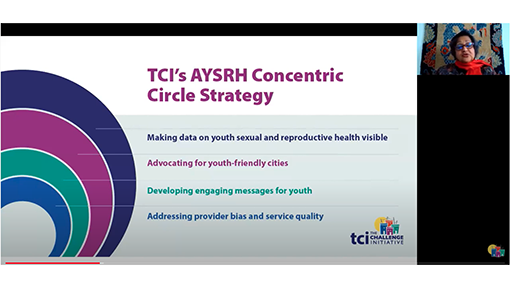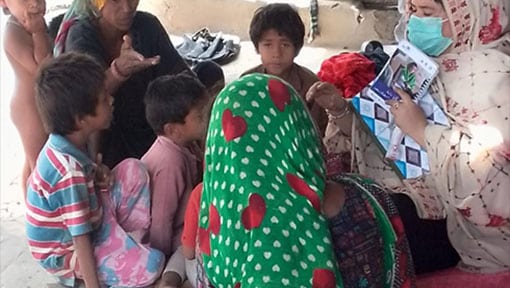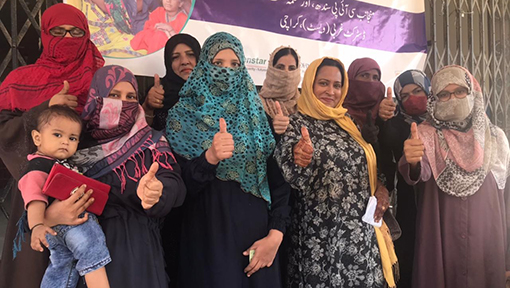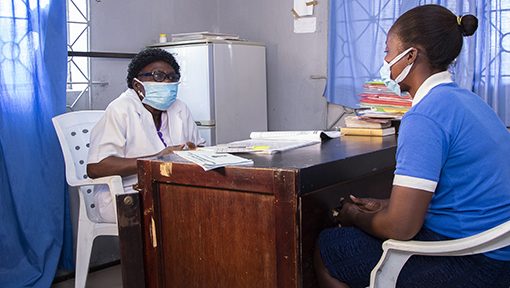TCI Webinar Focuses on Activating Urban Health Systems to Deliver Quality Adolescent & Youth-Friendly Health Services
 After three years of supporting local governments in urban areas to scale up proven and promising adolescent and youth sexual and reproductive health (AYSRH) interventions, The Challenge Initiative (TCI) held a webinar Jan. 18 to reflect on what it has learned from its regional hubs in East Africa, Francophone West Africa, India, Nigeria and The Philippines.
After three years of supporting local governments in urban areas to scale up proven and promising adolescent and youth sexual and reproductive health (AYSRH) interventions, The Challenge Initiative (TCI) held a webinar Jan. 18 to reflect on what it has learned from its regional hubs in East Africa, Francophone West Africa, India, Nigeria and The Philippines.
More than 400 participants joined to learn about TCI’s accomplishments in partnership with local governments – given the undeniable needs of adolescents and youth. As Gwyn Hainsworth of the Bill & Melinda Gates Foundation noted in her opening remarks:
With 1.8 billion adolescents and youth in the world, and growing, we are starting to see shifts to more meaningfully address the needs of adolescents and youth within FP and SRH programs. The challenge ahead is how to do this at scale and in true partnership with young people.”
TCI’s AYSRH Senior Technical Advisor Krishna Bose then introduced TCI’s AYSRH concentric circle framework, which seeks to:
- Make youth visible through data
- Advocate for youth-friendly cities at the government and community level
- Engage diverse youth populations through segmented demand generation
- Address provider bias and service quality at health facilities
The bulk of the webinar provided each hub the opportunity to share their experience implementing AYSRH programs in partnership with local governments. Albert Bwire, the AYSRH Technical Officer from Uganda representing TCI East Africa, shared creative solutions for making AYSRH data visible, especially in Kenya and Tanzania where age-disaggregated health management information system (HMIS) is not available. In addition, he shared how the East Africa region has also coached local governments to not only strengthen the capacity of pharmacies to deliver quality contraceptive services but also share their data with the public health system via the HMIS.
Local government stakeholders and youth leaders – representing Plateau State, Nigeria, and Dipolog City in the Philippines – shared how TCI coaching has helped them unlock local government financial resources to support AYSRH programming.
Hitesh Sahni, Deputy Director of TCI in India, presented his hub’s demand generation strategies, which includes a two-pronged approach – first focusing on first-time parents (FTPs) and then unmarried adolescents. Sahni said TCI coaches Accredited Social Health Activists (ASHAs) and their supervisors on how to derive FTP priority lists from diaries of their catchment areas, how to tailor their messages for this population, and how to provide quality counseling and referrals to fixed day static services at urban primary health centers specifically for them. The approach has expanded now to include unmarried adolescents, he said. Working with the Government of India’s National Adolescent Health Programme (Rashtriya Kishor Swasthya Karyakram-RKSK), TCI supports community Adolescent Health Days (AHDs) in five pilot cities.where unmarried adolescents, 10-19 years of age, can learn and discuss issues of concern. AHDs feature engaging games, which prompt the adolescents and youth to engage in dialogue about their health needs and options. In addition, through urban ASHAs, community gatekeepers are also informed about the AHDs so they are aware and can encourage unmarried adolescents to attend and participate.
Another aspect of TCI’s AYSRH concentric circle framework is the importance of meeting the demand generated with quality adolescent-friendly health services (AFHS). Josephat Avoce, Regional Manager of the AYSRH Program of TCI Francophone West Africa, shared the importance of addressing provider bias and service quality in his region through the adoption of an AFHS quality checklist that serves as the basis for the development of a remediation action plan with periodic application within the health system’s supportive supervisory visits. He noted that quality is not always linear but requires constant engagement, including with youth, especially as the public health system has faced numerous challenges because of the COVID-19 pandemic.
Dr. Venkatraman Chandra-Mouli, a leading AYSRH scientist at World Health Organization, concluded the webinar by noting that 60% of the world’s urban population will be under the age of 18 by 2030 and it is imperative to reach them with the health information and services that they need. This population cannot be ignored any longer, her said. He shared his excitement about how TCI’s model addresses four major problems:
Problem 1: Health facility level data is unseen and invisible, and private pharmacy data is not included in government statistics though adolescents all over the world often choose pharmacies as their preferred source of contraceptives.
- Uganda, Kenya and Tanzania have shown how data can be made visible and used for to make a case for action.
Problem 2: Government interest in supporting adolescent health programs is unrecognized and untapped.
- Nigeria and the Philippines have shown that when informed and engaged, government officials provide wholehearted support, including funds.
Problem 3: Government family planning programs do not prioritize young people.
- India showed that local government bodies were ready to put in place both contraceptive provision and adolescent demand generation activities for first-time parents and unmarried young people.
Problem 4: Training – often one-off training – is the only approach used to address the problem of poor health worker performance.
- Benin, Burkina Faso, Cote d’Ivoire, Niger and Senegal have shown the value of using simple and quick health facility assessments and a package of actions to improve health worker performance.
To learn more, view the full recording (in English) below.






